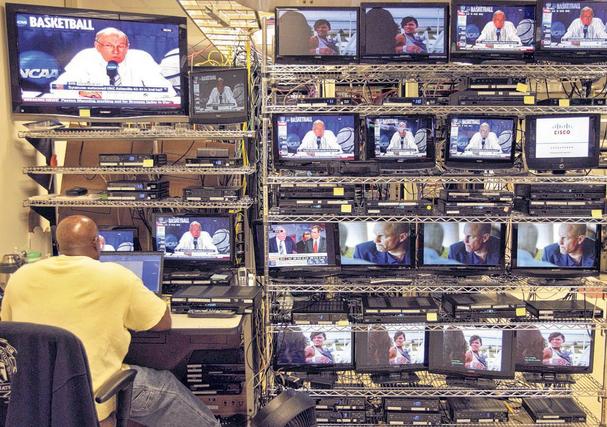Six years after Cisco Systems bought Scientific Atlanta, high-tech giant Cisco says its metro Atlanta acquisition is critical to its efforts to profit off the rising tide of video streaming around the globe.
Cisco has “a huge commitment to video,†John Chambers, Cisco’s longtime CEO and chairman, said in a telephone interview recently after talking to about 1,000 Cisco employees near its Lawrenceville operation, which designs set-top boxes and related devices for cable TV service. The devices are manufactured outside the U.S.
Chambers said video-related traffic is growing exponentially and is expected to account for 91 percent of Internet data flow within three years. Cisco’s Lawrenceville unit will design much of the hardware and software that handles that traffic.
To play a central role in that growing business, Cisco has been reaching beyond the set-top box business into other software and hardware pieces of an ever-expanding range of cable, telephone and wireless networks. The goal: to supply many pieces of intelligent networks that allow people and businesses to view television and other types of video where ever they happen to be, whether in their homes, commuting or on vacation or business trips.
“This isn’t [about] set-top boxes. It’s how you bring video into the home, into wherever,†said Chambers. “This is right now our sweet spot for where we want to go.â€
That is a very different message from what folks at the former Scientific Atlanta operation have been hearing in recent months.
Rumors have swirled that San Jose, Calif.-based Cisco may want to sell all or part of the operation, now called Cisco’s Service Provider Video Technology Group. Several news stories recently speculated that Cisco wants to shed relatively slow-growing, less profitable businesses such as set-top boxes.
Cisco is currently the second-largest producer of the devices, which tune, decode and in some cases store cable TV shows for later viewing.
It’s not surprising that rumors of a sale have been persistent, said Jeff Heynen, broadband and video analyst for Infonetics Research.
“There’s been a lot of concern around the set-top box business,†said Heynen. It’s a mature business with relatively thin profit margins, by Cisco’s standards. He projects sales of set-top boxes in North America will be flat or slightly down over the next few years.
Blair King, an equity analyst with Avondale Partners in Nashville, said the set-top box business has dragged down Cisco’s earnings, though the company remains profitable. Cisco reported $6.5 billion net income for its last fiscal year, down 16 percent from 2010.
Cisco’s shares have been under pressure from investors, rising only about 20 percent since it announced the Scientific Atlanta deal in late 2005.
King expects Cisco to hang on to the former Scientific Atlanta unit because its devices are in millions of homes, creating a “really significant footprint†for Cisco’s new products. Cisco’s video group accounted for about 10 percent of Cisco’s revenues of $43.2 billion last year.
Such footprints matter. Unlike retail products such as iPads and laptop computers, Cisco sells its set-top boxes to big cable and telecom companies. The cable operators typically have several vintages of Cisco’s and Scientific Atlanta’s devices in their customers’ homes; they want the new and old versions to work well together and offer as many of the same new features as possible.
With its $6.9 billion acquisition of Scientific Atlanta, Cisco started a string of acquisitions focused on consumer-related gadgets. Cisco’s plan was to expand beyond its main products, the routers, switches and other hardware that help run the Internet and other network and communication systems.
But last year, Cisco appeared to go into retreat from its consumer strategy. It shut down one consumer business it had acquired a few years ago, its Flip video camera business.
It cut 6,500 jobs in a restructuring, including roughly 200 jobs at its Lawrenceville campus. Cisco also sold the former Scientific Atlanta unit’s 5,000-employee manufacturing plant in Juarez, Mexico, to a Taiwan-based electronics manufacturer, Foxconn Technology Group.
The video group now has about 2,500 employees world-wide and over $3.6 billion in annual sales.
The group employs 724 at its Lawrenceville campus, about half as many as six years ago because jobs were shifted to other locations. Cisco said total employment in Atlanta is 1,952, mostly other units’ sales staff.
Many of the video group’s employees are software and electronics engineers who figure out nifty upgrades to entice cable and telecom companies’ customers. In one upcoming update of its set-tops that connect to the Internet, a viewer can watch a favorite show on the move, pausing and resuming the show as he or she switches from one TV to the next in various rooms, or from a television to a tablet computer or other smart device. Viewers also may soon use multiple gadgets at the same time to watch a show and instantly check an actor’s bio or shop for clothing or other items as they appear on the screen.
“It’s the ultimate product placement,†said Daren Mallard, a marketing manager at the video group.
Many of the Lawrenceville employees’ efforts, however, are aimed at stuffing new features into old technology and testing how well it works. By tapping into remote computers and software on the so-called “cloud,†the engineers have added new features to set-top boxes that were installed in cable customers’ homes years ago.
“We’re trying to help our [cable] customers transition to . . . cool features . . . on hardware that was never designed to support this,†said Mallard.
Still, like those changing connections between old and new technology, shifting cross-currents in the industry are fueling the debate over whether Cisco should or shouldn’t exit its set-top box business.
Motorola, the No. 1 maker of the devices, tried unsuccessfully in 2009 to sell its set-top box business, according to news reports. Now Google plans to buy cellphone maker Motorola Mobility for $12.5 billion. But it reportedly plans to sell the unwanted set-top box business, a part of that deal, probably to a private equity firm.
But as people spend more time watching shows on devices other than televisions, more companies are trying to crowd into the pay-TV business.
For instance, chipmaker Intel is developing an Internet-based television service and its own set-top boxes, according to news reports earlier this month. Apple and Google have also launched other versions of TV service.
Cisco officials say the company has no plans to sell its set-top box business.
Asked if rumors of a planned sale are true, Chambers said, “Of course not.â€
“There is no hesitation about our commitment here,†said Chambers. He said he had decided about two months ago to visit Cisco’s Atlanta operations, but the rumors added new urgency to his visit.
“We wanted to send a message that we’re committed to . . . Atlanta,†he said. “When there is something stressing our organization,†he added, “I express my opinion.â€
Indeed, Cisco’s video group is growing again.
Earlier this month, Cisco announced a $5 billion deal to buy NDS Group Ltd., a video software company based near London. Cisco plans to add the business to its video group, roughly tripling the unit’s workforce to about 7,700 worldwide.
The acquisition isn’t expected to directly affect the video group’s Lawrenceville operation. But by adding NDS’s software, which helps control video content on set-top boxes and other devices, Cisco hopes the deal will broaden and speed up its efforts to launch new video-related products.
“NDS is very advanced in some components. We are very advanced in other components,†said Chuck Robbins, Cisco’s senior vice president for the Americas, based in Lawrenceville. “It may be the most complementary acquisition we’ve ever done.â€
Some industry analysts agree that Cisco has good reasons to stay in the set-top box business.
Heynen, with Infonetics, said the former Scientific-Atlanta unit is a key piece of Cisco’s bid to capitalize on growing video traffic on the Internet.
Burgeoning traffic on those networks, in turn, feeds the demand for Cisco’s core business — routers and switches.
“They make these acquisitions, at the end of the day, to sell more routers,†said Heynen.
King, with Avondale Partners, said the set-top box business gives Cisco a big head start in the battle for America’s living rooms, smartphones and tablet computers. For the moment, he said, that battle is focused on cable and telecom operators’ shift from traditional cable service to “hybrid†sets such as Cisco’s “Videoscape†units that also connect to the Internet.
Sales of such devices are expected to grow from about $400 million a year to $4 billion within three or four years, he said.
“It’s a business that Cisco wants to be in,†he said, but so do a lot of other companies. Atlanta-based Arris Group recently rolled out its “Moxi†hybrid set-top boxes. Samsung and TiVo also are taking on Cisco, he said.
“When you see a market growing that fast, it’s going to attract a lot of newcomers,†said King.
Cisco won’t drop video, says CEO By Russell Grantham
by JAM | Mar 30, 2012 | Broadband, jobs, LISTA, Skills, software development, spectrum, wireless


